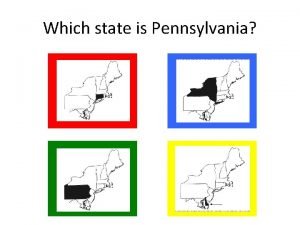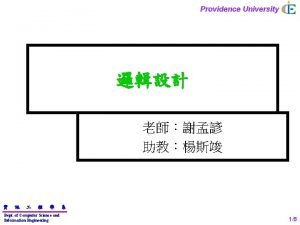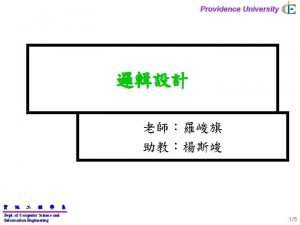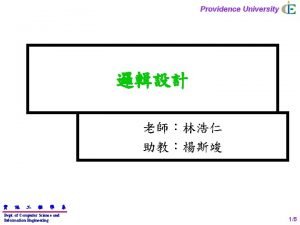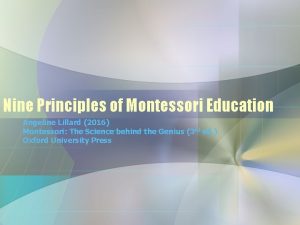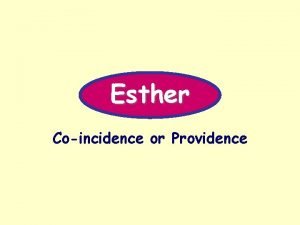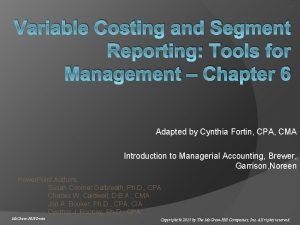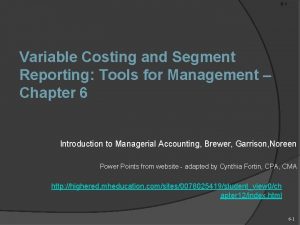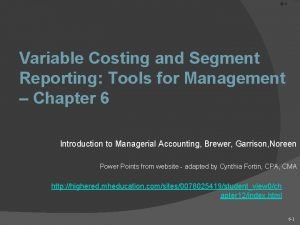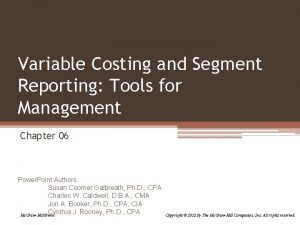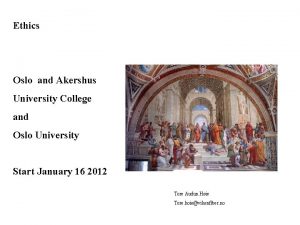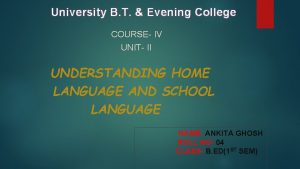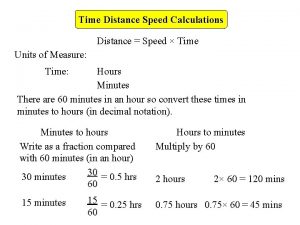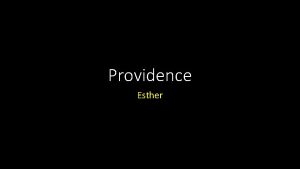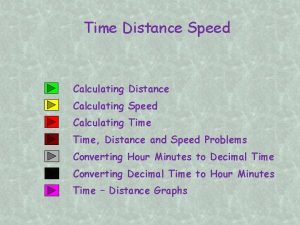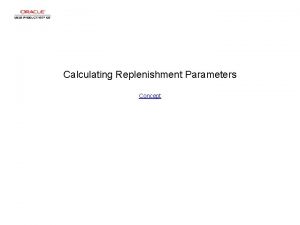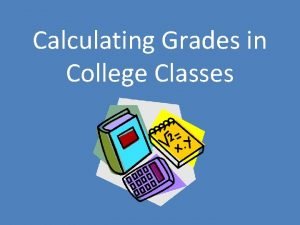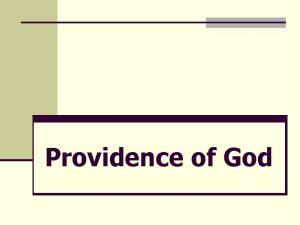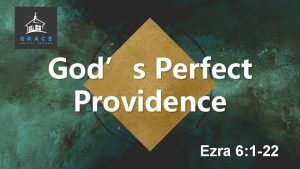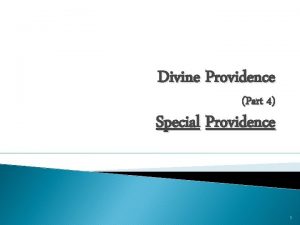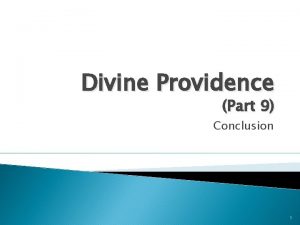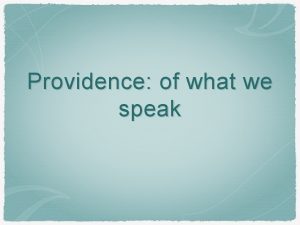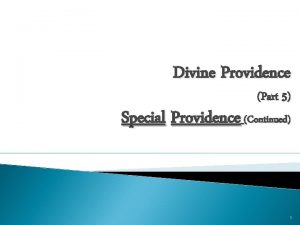Providence University College of Management Calculating and Reporting




















- Slides: 20

Providence University College of Management Calculating and Reporting Wu-Lin Chen (wlchen@pu. edu. tw) Department of Computer Science and Information Management

Calculating • Mathematics is the language of science. – It is inevitable to deal with calculating in the scientific writing. • The accuracy of predictions depends on the accuracy of the measurements and computations used in experimentation. Technical Writing S 03 Providence University 2

Using English To Calculate • Mathematical relationships can be expressed in sentences using phrase like – is equal to – is proportional to – is the product of Technical Writing S 03 Providence University 3

Using English To Calculate • EX: … the weight of the air at sea level is equal to 14. 7 pounds per square inch. – weight = 14. 7 pounds / 1 square inch • EX: The pressure inside your body equals to the pressure outside. – pressure 1 = pressure 2 • EX: The pressure on a diver is thus equal to the weight of the atmospheric pressure plus the water pressure. – pressure on diver = atmospheric pressure + water pressure Technical Writing S 03 Providence University 4

Using English To Calculate • The pressure of the water is directly proportional to the depth. – water pressure ∞ depth • Mathematical relationships are expressed in the present tense because they are universals. Technical Writing S 03 Providence University 5

Indefinite Articles • Rules for using indefinite articles (a and an) 1. Plural nouns never take the indefinite article. 2. Some nonplural nouns (countable singular nouns) take indefinite articles and some (uncountable nouns) do not. 3. Some nouns used frequently in scientific writing can be countable or not countable, depending on how they are used. – – – sound (in general) or a sound (a particular sound) glass (the substance) or a glass (the kind we drink from) color (in general) or a color (such as red or blue) Technical Writing S 03 Providence University 6

Definite Articles • The definite article (the) may be used with – – • plural nouns either countable or uncountable singular noun. Common rules in scientific writing are: 1. to specify or refer to something that has been already mentioned 2. to refer to something that is unique 3. to refer to something specific 4. to express superlatives 5. with ordinal numbers 6. with a noun that is followed by an of phrase – Technical Writing S 03 EX: theory of relativity Providence University 7

Writing Skills (Parallel Form) • It is preferable to write a list of items in parallel form. – EX: Ellen likes to paint, swimming, and dance. (wrong) – EX: Ellen likes painting, swimming, and dancing. (correct) – EX: Ellen likes to paint, to swim, and to dance. (correct) – EX: Ellen likes to paint, swim, dance. (correct) Technical Writing S 03 Providence University 8

Writing Skills (Parallel Form) • There should be some consistency and regularity in tense and person in any paragraph. • Decide the most appropriate tense (present, past, or future) and use that tense throughout. • Then, decide if you are going to write in the first person (I or we), second person (you), or third person (he, she, they, John, and son on). Technical Writing S 03 Providence University 9

Reporting • Modern science did not really begin until people started reporting their observations and discoveries and communicating their idea. • Today, scientists report their findings and detail their experimental methods in journals, inviting others to perform experiments to verify or disprove the results. Technical Writing S 03 Providence University 10

Using English to Report • Different tenses are used to report past actions. The simple past tense is the most frequently used in scientific writing. Technical Writing S 03 Providence University 11

Using English to Report • A completed action – This one-celled organism ate, grew, responded to its surrounding, reproduced itself, and spread throughout the oceans. (These actions have taken place a long time ago and are completed. ) • – – Simple past tense: ate, grew, responded, reproduced, spread Probably those first tiny organisms were not all alike. (This sentence reports a condition rather than an action. ) …their characteristics were passed onto the next generation. (The passive form is used because the action is more important than the performer of the action. ) Technical Writing S 03 Providence University 12

Using English to Report • An uncompleted action – To date, more than 400, 000 species of plants and 1, 200, 000 species of animals have developed. (This is an action that has taken place over a period of time, it taking place now, and will probably continue into the future. ) • Present perfect tense: have developed – All life has probably evolved from that single cell … (This action is also incomplete, that is, life is still evolving. ) Technical Writing S 03 Providence University 13

Using English to Report • An action completed before a given past time – Therefore, about 2. 5 billion years had passed on the earth when life originated. • Past perfect tense: had passed Technical Writing S 03 Providence University 14

Sentence Pattern • Reporting a completed action (Simple Past Tense) published Darwin announced his theory of evolution in 1859. proposed Technical Writing S 03 Providence University 15

Sentence Pattern • Reporting an uncompleted or recent action (Present Perfect Tense) Biologists have He/She has Technical Writing S 03 often already just seldom sometimes not yet recently still not usually made Providence University new discoveries. 16

Sentence Pattern • Reporting an action completed before a given time (Past Perfect Tense) – By the time we {arrived}, the bomb {had exploded. } – By 1957, Russia {had launched} the first Sputnik. Technical Writing S 03 Providence University 17

Sentence Pattern • Reporting a continuous action (Past Continuous, Present Perfect Continuous, and Past Continuous Tenses) – Darwin {was working} on his theory while in the Galapagos. – The universe {has been expanding} {for 15 billion years (since its inception)}. – Darwin {had been riding} in his carriage when the idea came to him. Technical Writing S 03 Providence University 18

Sentence Pattern • When reporting – Adverbs of time and frequency (such as often, already, and usually) are usually used with the present perfect tense. – The continuous past tenses do not occur frequently in scientific writing. Technical Writing S 03 Providence University 19

Writing Skills • When you are reporting facts, which answer the questions who, what, when, where, why, and how. Technical Writing S 03 Providence University 20
 Providence college library
Providence college library Providence university taiwan ranking
Providence university taiwan ranking What state's capital is providence
What state's capital is providence The village lofts pawtucket
The village lofts pawtucket Recfe
Recfe Providence engineering
Providence engineering Providence engineering
Providence engineering Providence engineering
Providence engineering Angeline lillard montessori
Angeline lillard montessori Esther
Esther Providence montessori school
Providence montessori school Abraham journey map
Abraham journey map 沈榮麟
沈榮麟 Variable costing and segment reporting tools for management
Variable costing and segment reporting tools for management Variable costing and segment reporting tools for management
Variable costing and segment reporting tools for management Variable costing and segment reporting tools for management
Variable costing and segment reporting tools for management Variable costing and segment reporting
Variable costing and segment reporting Oslo and akershus university college
Oslo and akershus university college University bt and evening college
University bt and evening college Time distance/speed formula
Time distance/speed formula Distance time speed formula
Distance time speed formula


